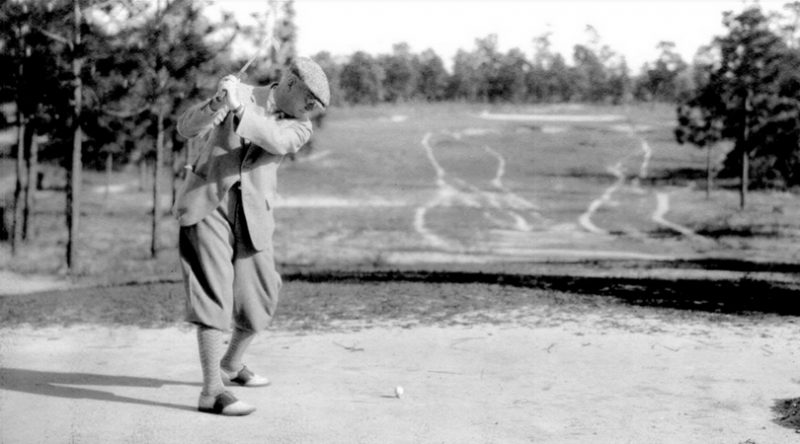People are drawn to golf because of the challenging rules and stunning courses that add surprise and delight to this traditional sport. Geographic factors like the natural landscape and weather patterns also come into play.
Because golf provides such unique venues, the golfing experience can vary drastically. Thus, after designing 400 golf courses over his career, Donald Ross represents one of the chief architects of the American golfing experience.
Although Donald Ross passed away in 1948, he remains an architect of more than just golf’s many venues – and the creator of countless memorable golfing moments for professionals, spectators, and the casual player.
Scottish-Born Ross Follows His Destiny to America
Born in 1872 in Dornoch, Scotland, Don Ross was drawn to the game of golf from a young age. Eventually, he put his enthusiasm to work, undertaking an apprenticeship at St Andrews Links under Old Tom Morris – a revered Scottish golf enthusiast. Ross absorbed a significant breadth of knowledge and inspiration from Morris, at least until he felt compelled to make his own mark on the game.
In 1899, Don Ross followed the waves of Europeans migrating to the U.S. He managed to secure a job at the Oakley Country Club in Massachusetts, in part due to the help of Harvard University professor Robert Willson.
While this was the first stepping-stone in manifesting Don Ross’s blueprint for golf, it wasn’t until Ross earned the position of head professional at Pinehurst Resort that he got his big break and began designing golf courses for the first time.
Ross also managed a moderately fruitful golfing career. While his name is enshrined in the annals of golf for his work as an architect, he won a handful of tournaments and had top-10 finishes in two majors. He was no golf hobbyist.
Ross Starts Designing Courses
After working at Pinehurst Resort and designing four preliminary courses, Ross began focusing full-time on golf course design. When Ross launched summer offices in Rhode Island, Donald J. Ross and Associates was born.
Donald J. Ross and Associates designed and landscaped American golf courses until 1948, employing thousands of workers at the height of Ross’s design prowess. While Ross retained his standing in professional golf, his fame began to grow in relation to his architectural exploits.
Ross remains most well-known for designing some of golf’s preeminent venues: Pinehurst No. 2, Oakland Hills Country Club, Seminole Golf Club, Inverness Club, Hope Valley Country Club, and Oak Hill Country Club, to name a few. Several of these courses have such steep natural hills and sprawling fairways that utilizing a golf cart becomes a necessity.
For those who want to tour these beautiful courses without playing a round, a golf cart with a rear seat can allow the transportation of more individuals.
Architectural Style
Ross subscribed to one cornerstone philosophy when approaching design. The function of a championship course was to test a golfer on all parts of his game and every type of shot.
While many architects tailored their designs to reward specific parts of the game – such as long holes with wider fairways, or short holes that require precision p Ross’s philosophy ultimately attempted to cultivate the complete, all-around golfer.
A renaissance man of golf himself, Ross hoped to foster a similar mentality of holistic dedication for those who played his courses. According to the legendary Golden Bear, Jack Nicklaus, “His stamp as an architect was naturalness.”
Ross is known for retaining the natural contours of the land, creating challenging holes while excavating little terrain. He drew inspiration from nature itself, rather than past architects, attempting to mold nature without making it blatantly artificial. The golf course was meant to be a thing of beauty, a game played while surveying the grandeur of the land.
Pinehurst No. 2
Ross routinely employed trademark features in his courses, including severe run-up shots with trouble at the back of the green. He also incorporated infamous “turtleback” or crowned greens – the notorious design utilized by Pinehurst No. 2.
The turtleback greens are highest in the center and falls away on the sides. It was on Pinehurst No. 2 that Ross revolutionized early greenkeeping practices, transitioning the greens from oiled sand to Bermuda grass in the 1930s.
Pinehurst No. 2 would go on to host more golf championships than any American venue, and the turtleback greens definitely add to the challenge of the course.
Death and Honorary Recognition
Ross eventually became a founding member of the American Society of Golf Course Architects, a society first established at the Pinehurst Resort in 1947. While Ross was the first president of this golf institution, he passed away only a year later, and golf lost one of its greatest visionaries.
In 1977, the global golfing community recognized Ross’s significant contributions to the game, admitting him to the World Golf Hall of Fame. This honor was rarely bestowed on anyone who is not a player, making this level of recognition a singular distinction.
Over the years, many Ross courses underwent renovations to help restore Ross’s original designs. This is a delicate process, however, one in which renovators often take the liberty of implementing subtle changes. For skilled Ross renovators, evaluating original photographs and blueprints represent merely the starting point. These individuals must begin to think like Ross to reimagine his courses. Anything short of complete attention to detail jeopardizes Ross’ many lasting works.
Final Thoughts
Ultimately, Ross created the foundational backbone of golf’s many landmark courses. By designing hundreds of courses throughout his career, Ross facilitated unique playing experiences for millions.
Without the influence of this Scottish architect, who first migrated to the U.S. with only a minor apprenticeship under his belt, golf would not be what it is today. Moreover, the golfing community continues to celebrate Ross’s achievement with each round it plays at his courses.




